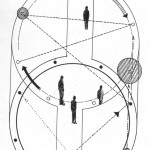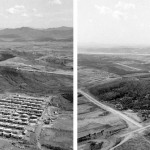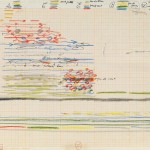We are back from Linz and so, so impressed.
Despite still being overwhelmed by ideas, imagination and people from this edition of the world’s most influential Festival of Arts, Technology and Society, we’ll try and draw some conclusions.
Before dedicating the next writings to the works we’ve liked or which just impressed us, (not necessarily meaning a selection of the “best” work), there are some other reasons that should convince you that Ars Electronica is really worth a visit.

First: you still have some time, since the Festival closes its doors on September 11th.
Then, this year saw a debut of a singular kind: the new location of the Festival. Well “new” is not exactly the proper term, since the huge industrial halls hosting the festival formerly housed the national cigarettes factory of the city, the “TabakFabrik” designed by renowned architect Peter Behrens in 1928 and completed in 1935. After some transactions, the city acquired the factory in 2009 and, despite not being completely accessible, they decided to open it to the public for the first time during this edition of the festival.
We just hope they could use it in the next years as well, cause the enormous open spaces appear perfectly adaptable to the different ambiances the artists and their works needed: from empty, dark rooms filled with tiny ambient sounds, to the mess-like spaces of the collective DIY communities like the guys from MAKE, till the “infinite” corridors of Kubrician memory.



More importantly, what let Ars Electronica stand our respect of other major events is the climate of constant informal exchange between artists, creators, scientists, theorists and simple visitors. You really don’t feel that typical aura of detached artistry of Venice’s Biennale. Don’t see us as naives, but you can’t help liking how everybody here is happy to explain and discuss his/others works, the way they’re done, the process involved, the tools used and the possible cultural implications. A climate of constant exploration and inventiveness is easily perceivable in the air and the best results stands not much from the singular prize winning oeuvres but more from a sort of collective production.


Some cultural tendences and speculation themes are clearly emerging, here a quick and random list of things popping out of our mind:
The need for a manipulation of the objects instead of their deletion: “don’t recycle, repair” was this year’s official motto;
The festival as a factory: you have the materials, now work them;
Open source as a style of life;
People as active subjects in the production of objects, not only ideas;
Criticism and creative response to mass production through analysis and alteration of goods’ use and purpose.
We almost forgot to say that, beside this unfinished intellectual flow, the Festival was, and still is, SO FUCKING FUNNY!
(jump to 2:30 for the cool part)
httpvh://www.youtube.com/watch?v=B7ET8hSuNbc
* “It’s too late to be a pessimist” is a quote from Yann Arthus-Bertrand.





Reading this post I just realized that probably, the most important impact of the open source movement / communities on our society is not technological but cultural.
Maybe you knew that long ago…
Btw, GNU/Linux will conquer the world! ; P
We are maybe far from seeing a real impact on mainstreem culture, but I do agree with you.
If you have some time, I’d like to know what do you think of Wikileaks / Julian Assange.
and BTW, you would have totally loved this festival, Kamal. :)